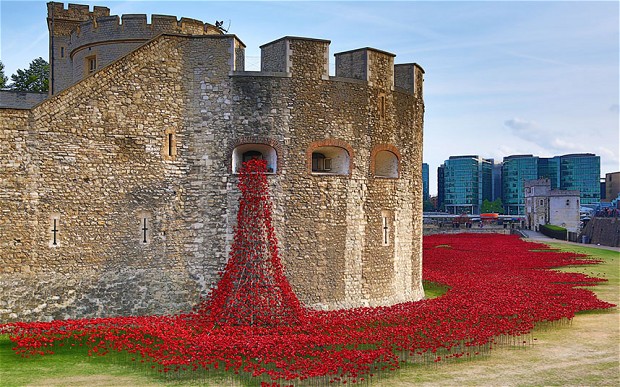World War One forever changed the way people viewed warfare. While young men signed up anxious to fight for their countries at the beginning of the conflict, they quickly realized how horrifying and fruitless this war would be. Technology doesn't always make life better and this truism was borne out by the new machine guns, barbed wire, gases, artillery shells and flamethrowers used for the fighting. Deemed a "war of attrition," many suffered but little territory could be gained in the stalemate volleys of hideous inventions. The war produced a "lost" generation who felt bereft of any meaning and hopeless about the future. Their poetry and memoirs show us just how sad it is to realize that things aren't what you thought they were. War did not bring glory--only pain and loss. The ambivalence of later conflicts, such as Vietnam, seems to me to be a direct result of this conflagration.
So how does such despair leave us thankful? I am grateful that after the First World War an international peacekeeping body, The League of Nations, formed to try to balance the power scales of the world and to outlaw the use of chemical weapons. Even though that institution didn't last, it set the stage for the United Nations to be born a couple of decades later. Though the U.N. is not perfect, it does produce expectations for proper world conduct and studies the difficulties inherent in poverty-stricken or war-torn regions. It tries to provide research and solutions to our world's largest problems.
I am thankful that the lost generation established a precedent of viewing war with skepticism. This is healthy, especially in a democratic republic. We should not blindly accept what our leaders say but rather question, research and argue until we are reasonably satisfied with their responses. This is not disloyalty--on the contrary--it is the process that differentiates democratic governments from totalitarian regimes.
And, of course, I am grateful for those who, despite skepticism or fear, have the courage to serve because they know that the values they are fighting for are worth a hefty price. Such willingness to protect one's country is beyond admirable--I actually consider it miraculous.
What we can take away:
- List the things for which you are grateful, both big and small
- Choose a "gratitude trigger"--something that will remind you to be thankful (like giving thanks every time you walk through the front door)
- Say thank you more often, even for the little things
- Donate to a Veterans Organization such as AMVETS. Our veterans have not been treated as well as they should be by our institutions, but we can personally try to make a difference. http://www.amvets.org/
- When you read of conflicts in the news, remember that war is suffering even if the cause seems just. Extend your prayers to all those paying the price for political ends, civilians and military personnel.
- Never treat violence lightly. Reconsider the movies you watch and the games you play. If violence is a key component then reconsider your core values. My father was telling me that his uncle, who lived through the D-Day Invasion, never allowed any articles/reminders of war in his house. No guns, no memorabilia.
Support your soldiers, but wish always for peace.
Gratefully yours, Lisabeth

 RSS Feed
RSS Feed